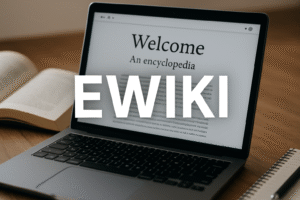
Ewiki: The Future of Collaborative Knowledge Platforms
In today’s digital age, the way we create, share, and consume knowledge has dramatically evolved. One of the most intriguing innovations in this space is Ewiki — a modern, flexible, and decentralized alternative to traditional wikis. Whether you’re a developer, educator, business owner, or content creator, Ewiki offers a unique way to manage and collaborate on knowledge effectively.
This article explores what Ewiki is, how it works, and why it’s becoming a game-changer for collaborative documentation and open-source communities. Let’s dive in.
What is Ewiki?
Ewiki is a lightweight, extensible wiki engine built to simplify the process of creating and managing collaborative documents and knowledge bases. Unlike legacy wiki systems, Ewiki is designed with modern users in mind — offering easy integration, markdown support, and decentralized editing capabilities.
Originally inspired by the need for a faster, more modular documentation tool, Ewiki has grown into a powerful, developer-friendly platform that empowers users to build their own custom wikis for any use case.
Whether you’re building an internal company knowledge base, a project documentation site, or even a personal wiki, Ewiki provides the tools you need with minimal setup.
Key Features of Ewiki
1. Open Source and Lightweight
Ewiki is open-source, meaning it’s free to use, modify, and distribute. Its lightweight nature ensures it runs smoothly even on low-resource servers, making it an excellent choice for individual developers and small teams.
2. Markdown-Based Editing
Instead of relying on complex editors or custom markup, Ewiki supports Markdown by default — making content creation fast, simple, and intuitive. If you’ve ever written a README file on GitHub, you’ll feel right at home.
3. Version Control Friendly
Ewiki is designed to integrate seamlessly with version control systems like Git. Every edit you make can be tracked, rolled back, or merged just like code. This makes it perfect for collaborative projects where transparency and control are important.
4. Customizable and Extensible
With a plugin-based architecture, Ewiki allows you to extend its features based on your specific needs. Want to add authentication, themes, or custom workflows? You can do it easily with community plugins or your own custom code.
5. Minimal Dependencies
Unlike bulky CMSs or enterprise wikis, Ewiki doesn’t require complex environments. You can run it on basic web servers without the need for bloated software stacks.
Why Use Ewiki Over Traditional Wiki Engines?
Popular platforms like MediaWiki or Confluence are widely used — but they can also be overly complex and resource-heavy. Here’s how Ewiki stands out:
| Feature | Ewiki | MediaWiki / Confluence |
|---|---|---|
| Lightweight | ✅ Yes | ❌ No |
| Git Integration | ✅ Native support | ❌ Requires third-party |
| Markdown Support | ✅ Yes | ❌ Limited / Not native |
| Open Source | ✅ MIT Licensed | ✅/❌ (Confluence is paid) |
| Easy to Customize | ✅ Plugin Architecture | ❌ Limited flexibility |
For developers, small businesses, or open-source communities, Ewiki offers the perfect balance of simplicity and power.
Popular Use Cases for Ewiki
-
Open Source Documentation
Ewiki is perfect for maintaining clean, structured, and easily navigable documentation for open-source projects. -
Team Knowledge Base
Companies can set up private wikis for internal documentation, policies, SOPs, and onboarding. -
Personal Wiki or Second Brain
Ewiki’s minimalistic design makes it ideal for setting up a personal knowledge base or digital garden. -
Educational Material Repository
Teachers, students, and academic communities can use Ewiki to collaborate on research, syllabi, and learning resources.
How to Get Started with Ewiki
Setting up Ewiki is straightforward:
-
Install Dependencies
Ewiki usually requires a basic web server and a scripting language (e.g., PHP or Python, depending on the fork). -
Clone or Download Ewiki
You can find various open-source versions of Ewiki on platforms like GitHub. For example, one of the widely used versions can be found here:
👉 https://github.com -
Configure Settings
Customize your installation based on your needs — choose themes, plugins, and access controls. -
Start Creating Pages
Use Markdown to start adding content. Link pages together, create categories, and begin building your knowledge base.
Tips to Optimize Your Ewiki Installation
To make the most of your Ewiki setup, consider the following:
-
Use a Custom Domain: Host your Ewiki on a dedicated subdomain like
wiki.yoursite.comfor branding and SEO. -
Enable Search Functionality: Add a search plugin to make navigation easy for users.
-
Regular Backups: Automate backups of your Ewiki content and Git repository.
-
Use a Clean, Responsive Theme: Ensure your wiki is readable and mobile-friendly.
-
Secure Access: Set up access controls, especially if your wiki contains sensitive or internal information.
Ewiki and SEO: A Hidden Advantage
If you’re running a public-facing Ewiki, you’re also getting a valuable SEO asset. Because Ewiki pages are text-rich, highly structured, and often interlinked, search engines love them.
Here’s how Ewiki supports SEO:
-
Fast Load Times: Lightweight pages mean faster indexing and better user experience.
-
Keyword Optimization: You control the content — optimize every page for relevant keywords.
-
Structured Content: Markdown encourages clean hierarchy (H1, H2, H3), improving readability and indexing.
-
Internal Linking: Like Wikipedia, linking between Ewiki pages helps with crawlability and time-on-site.
If you’re using Ewiki to build niche content around a particular topic, you can rank well in organic search — especially for long-tail keywords.
Final Thoughts: Is Ewiki Right for You?
In a world flooded with complex content management systems, Ewiki offers a refreshing return to simplicity. It’s a tool that puts control back in your hands — whether you’re managing documentation for a team, sharing open-source knowledge, or building a personal knowledge vault.
If you value speed, simplicity, flexibility, and collaboration, Ewiki is more than worth exploring. As open-source software continues to reshape how we build and share knowledge, tools like Ewiki are leading the way.
FAQs About Ewiki
Q: Is Ewiki suitable for non-developers?
A: Yes, while it’s developer-friendly, the Markdown-based editing and minimal setup make it easy for non-tech users too.
Q: Can I host Ewiki on my own server?
A: Absolutely. Ewiki is designed for self-hosting and can run on basic shared hosting or VPS setups.
Q: Does Ewiki support multiple users or editors?
A: Yes. Depending on the version and plugins, you can enable access controls, editor roles, and version tracking.
If you’d like help setting up your own Ewiki or customizing it for your project, feel free to reach out. Happy documenting!


